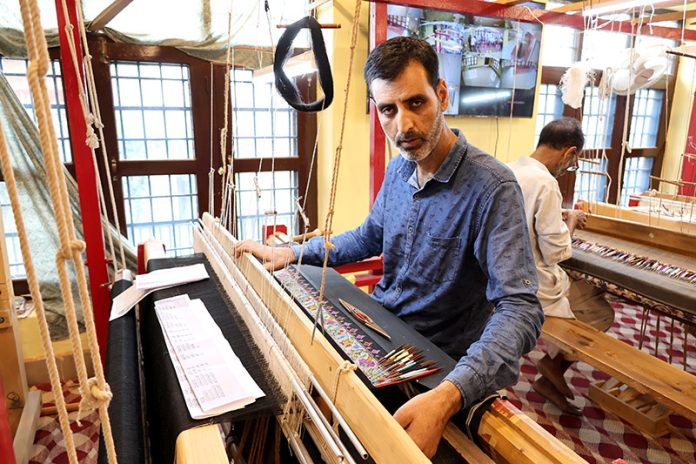
Suhail Bhat
Srinagar, Aug 2: The village of Kanihama in Budgam district has carved out a unique identity through its residents’ exceptional skills in preserving the legacy of creating exquisite Kani shawls, ensuring these shawls remain a cherished symbol of Kashmiri craftsmanship.
Kanihama’s name is derived from the “Kani,” small, oblong wooden spools integral to the intricate weaving process of these shawls. Renowned globally, Kani shawls were recently highlighted by Prime Minister Narendra Modi in his “Mann Ki Baat” program, where he praised the artisans’ dedication to preserving and promoting traditional handloom products. In his 112th address, Modi mentioned the Kani shawls alongside other notable Indian handicrafts, underscoring their cultural significance.
“We are thankful to the Prime Minister for consistently promoting Kashmir pashmina, especially Kani shawls, through his attire and as gifts to dignitaries,” Mehmood Shah, Director of Handicrafts and Handloom Kashmir, said. He noted that this endorsement comes as the village celebrates a national award conferred upon Fareed Ahmad, a distinguished artisan from Kanihama.
Shah explained that the village, strategically located on the Gulmarg-Srinagar Road, has been recognized as a craft village. “Currently, work is underway on the common facilitation center, cafeteria, library, and display center, aimed at linking craft with tourism and creating a new tourism vertical,” he said.
Kanihama, situated approximately 20 kilometers from Srinagar, offers a vibrant atmosphere with the rhythmic sounds of artisans practicing age-old techniques passed down through generations. As visitors stroll through the narrow alleys, they witness artisans creating masterpieces with their golden hands, cherished by the rich and famous worldwide. The village’s population is deeply involved in Kani shawl weaving, contributing significantly to its revival over the past five decades.
Central to this revival is the family of Sajjad Wani, a pioneer in Kani shawl craftsmanship. His father, Ghulam Mohammad Wani, known as “Kanihami sahib,” played a pivotal role in reviving the craft starting in the 1960s.
In 1994, he established the Kanhama Kani Shawl Cooperative Society, comprising nearly 110 artisans dedicated to reviving traditional designs. This initiative led to a Government-sanctioned research and development project reviving twelve classic designs, including the renowned Josephine design, once worn by Napoleon’s first wife, Marie-Josephine-Rose.
Kani shawls are celebrated for their intricate designs featuring traditional motifs like paisleys, flowers, leaves, and elaborate borders. “The shawl is designed with a needle made from wood,” Wani said.
He further elaborated that the tradition of Kani shawl weaving dates back to the era of Mir Syed Ali Hamdani, a Sufi saint credited with introducing Islam to Kashmir, with around 700 of his disciples being experts in various crafts, including Kani shawls. He added that under the patronage of Zain-ul-Abidin, Kashmir’s eighth sultan (1420-1470 CE), the craft flourished, but it faced challenges during the Afghan rule due to heavy taxation, which caused many artisans to abandon the craft.
Fareed Ahmad Ganie, a national award-winning artisan, expressed his delight at receiving recognition for his craft. “My family and I are overjoyed. This is a dream come true,” he said. Ganie noted that the price of Kani shawls varies depending on their length and complexity, ranging from Rs 18,000 to over Rs 5 lakh. He said the weaving process, guided by a coded pattern known as a “Talim,” can take from six months to two years, reflecting the meticulous effort and artistry involved.

